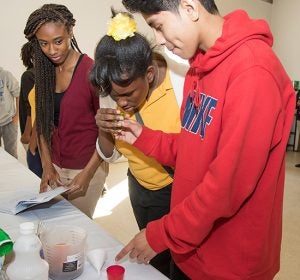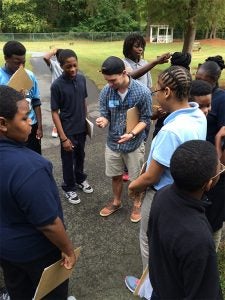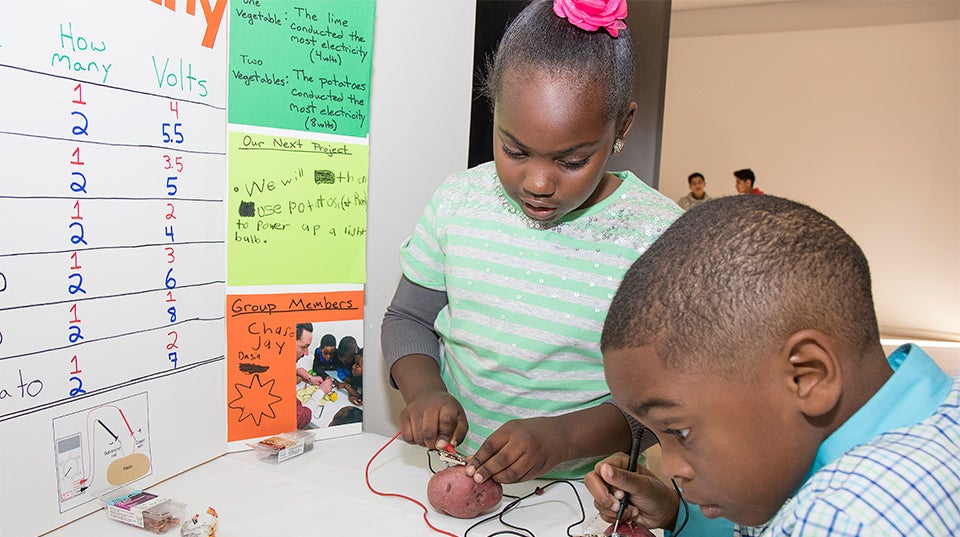ROLE MODELS
ECU students mentor local K-12 youth in science education
This academic year, ECU students are helping foster K-12 student interest in science and increase student confidence, while serving as positive role models.
Twice a week, Nina Franklin, a biology undergraduate from Raeford, N.C., and Casey Nolan, a coastal resource management graduate student, visit the afterschool program “Dare 2B Different” in Ayden, N.C. The program, which targets at-risk youth, provides elementary and middle school students with a nurturing and educational environment outside of school.
“From the very first day that Casey and Nina came to the program, the youth were excited and thrilled to have them,” said Rose Daniels, director of the Dare 2B Different afterschool program.
In the Dare 2B Different program, Franklin and Nolan facilitate group and individual science projects, and introduce the youth to new ways of understanding scientific concepts so they can apply them to what they observe in daily life. Students in the program choose a topic to research, and Franklin and Nolan mentor the students through the scientific process, helping them interpret their results.

ECU student Nina Franklin monitors an experiment being conducted by Tatiyanna Berry, age 14, and Mariano Galvan Rojas, age 14.
“I’m always excited to see a student become interested in something that they weren’t before,” said Franklin.
“What I enjoy most is watching the confidence that students have in their research abilities grow over time,” said Nolan. “Not only is that inherently rewarding, but it also tells me that what we area doing with this initiative is working.”
“Having Casey and Nina at the center has made a positive change in the life of our youth,” said Daniels. “The fear that the youth had about science projects is now gone. Instead of science being viewed as a homework assignment it is now viewed as a learning experience, a challenge to find a solution and the outcome of something they did. Allowing these youth the opportunity to be exposed to the joy of sciences will set them on a path of enjoying science for years to come.”
Another ECU student is fostering science education in the classroom. Jared Ingle, a biology undergraduate from Grifton, N.C., is working closely with Karen Quick, a teacher at C.M. Eppes Middle School, to mentor students on plant biology activities. Ingle develops lesson plans that incorporate plant biology and concepts of ethno-botany into Quick’s eighth-grade students’ normal course curriculum.

ECU intern Jared Ingle (center, plaid shirt) mentors eighth-grade students at C.M. Eppes Middle School in plant biology and ethno-botany. (Photo provided by Karen Quick, C.M. Eppes Middle School)
“What I love most is the fact that many of the opportunities we are providing these kids are firsts for them – first time using a microscope; first time learning about microbes; first time conducting a scientific experiment. To see the mystery and excitement they have for the material is extremely fulfilling,” said Ingle. “These lessons also provide them a break from the normal lesson plans and lectures. It lets them physically get out and see the world around them in a new light and find their place within the ecosystem that’s just outside.”
Quick said Ingle’s presence has made an impact on her students.
“My students enjoy having Mr. Ingles come to class every week,” said Quick. “I have had students tell me that ‘I’m not really a nature person,’ or that, ‘I don’t go outside.’ Since Mr. Ingles has been working with our 8th graders, they have all said that they think being outside is ‘more interesting’ and that they’ve never really thought that much about trees/plants until now.”
The paid, student internships are supported by a grant awarded from the Dominion Foundation, one of the nation’s largest producers and transporters of energy, to three faculty members from the Biodiversity Initiative in East Carolina University’s Department of Biology, Drs. Heather Vance-Chalcraft, Carol Goodwillie and David Chalcraft.
“ECU has a very talented collection of students on its campus, and opportunities for them to engage local youth in discussions about environmental issues and the scientific process is important,” said associate professor Chalcraft. “K-12 students are also more open to influence by ECU students than they would be from many older adults, creating the possibility for this mentorship to be transformative to the lives of the K-12 students.”
“We’re excited about these internships because they bring great benefits both to our ECU students and to youth in the community,” said associate professor Goodwillie. “For the local youth, the interns bring opportunities to investigate the natural world and do hands-on science.”
Chalcraft, Goodwillie and Vance-Chalcraft believe the grant funding has allowed students and faculty from the Biodiversity Initiative to strengthen partnerships with community organizations, local schools and the city, and to provide services to the community while offering ECU students valuable, learning experiences.
“When ECU students provide science training to K-12 students, they are challenged to communicate science effectively, think on their feet, be enthusiastic and think precisely about science concepts,” said Vance-Chalcraft. “All of these qualities are highly desirable to employers as well as graduate and professional schools.”

Clifton Daniels, age 6, and Dasia Little, age 8, demonstrate their experiment that measures the electricity produced by different vegetables. Clifton reads a voltage meter while both students connect probes to the potatoes.
